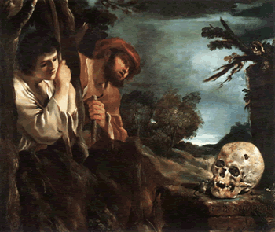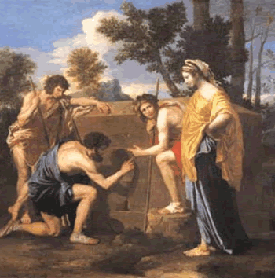The painting to the right is by the French artist Nicolas Poussin (d.1665). Rustic figures gather around a tomb; one of them kneels and points to an epigraph,Et in Arcadia Ego, “And I too once lived in Arcadia” (which is also the title of the painting). A melancholy, lyrical atmosphere pervades the scene as they think of the unnamed person who lies buried, someone like themselves who once lived among the same hills and valleys.
The real Arcadia was a region in southern Greece with a rugged mountainous landscape and inclement weather; but it had been thoroughly idealized by artists and writers to represent a quasi-mythical realm of beauty and harmony. According to the art historian Erwin Panofsky in Meaning in the Visual Arts, the Latin inscription may derive from the humanist scholar-poet Giulio Rospigliosi, the future Pope Clement IX (1667-1669), for whom it was a variation on the familiar theme of memento mori, “Remember thou too must die.” Some years earlier, in the first painting entitled Et in Arcadia Ego, the Italian artist Guercino depicted two shepherds happening upon a skull in the landscape as a storm threatens in the distance (see below). This painting impresses with the stunned reaction to the horror of death: the Latin motto Et in Arcadia Ego could be interpreted to mean, “And I, Death, am also in Arcadia.” By contrast, Poussin transformed the theme and the entire mood so that, instead of the Ego’s referring directly to the skull and death, the Ego now “speaks” for the departed shepherd, as it were, from beyond the grave. And instead of eliciting shock and the macabre, the motto seems to beg for quiet acceptance and graceful dignity—which it earns from the four inquiring rustics and, through them, from us.

Both paintings reveal the richness and complexity of the humanistic study of the arts. In this instance, such study orients us within a long tradition, through artists and writers in the Renaissance, back to the origins of idealizing rustic nature among the ancient Greeks and Romans, particularly in Theocritus and Virgil. For Panofsky, Virgil’s ability to render liminal twilight scenes with their melancholy moods was one of his great poetic achievements: “with only slight exaggeration one might say that he ‘discovered’ the evening.” Humanistic study leads across fields, travels through the social and political milieu, rises into the history of ideas; we pursue the expression and reinterpretation of classical ideals of nature, reason, harmony, balance, and proportion, and their transformation over the centuries. Such study helps us to comprehend the temper of the artist and the period—here, the sober classicism of Poussin, whose shepherds have a restrained, thoughtful manner and whose shepherdess, according to one critic, has the appearance of the Tragic Muse, presiding over the mystery of life and death. Humanistic study sharpens our perception of Time the Destroyer in the midst of natural life and peacefulness. Note the trees and landscape in the background, the perennial backdrop of human endeavor. The total effect is to heighten the awareness of beauty and the transience of all things: Arcadia survives, even as the Ego passes on. But “Arcadia” is also the artistic imagination, which gave life to Arcadia in the first place. Vita brevis, ars longa. Life is short; art, long.
A humanistic study of language, literature, and the arts generally should broaden one’s approach to other forms of knowledge and experience. The word “humanistic” is frequently abused; it is applied to anything good or remarkable—a humanistic movie, a humanistic company. Often it is confused with the emotions of humaneness or kindness or pity, which it can include but which it also transcends in its range and complexity. “Humanistic” refers originally to a curriculum that embraced both the arts and the sciences, with the goal of both knowledge and self-knowledge, described in terms of completeness or many-sided wholeness, a sense of proportion, and the recognition of truths above and beyond the self, with the harmonious development of various potentialities. Humanistic study has also come to mean a refined perception of what is true and lasting in human life. Periods of history or works of art vastly disparate in their intellectual and cultural circumstance are held in a single balance, grasped not only in their historical difference but in their power to reveal striking resemblances, “universals,” the undying constants (or near-constants) in human nature. “The Destinies,” writes Homer, “have given to mortals a heart that endures” (Iliad XXIV). At its best, such experience allows us to see life in its variety and otherness, its rich digressiveness, its synthesizing wholeness, not excluding a judgment on value. Through this process we come to fathom the enormous gulf that separates one epoch from another, but also the unitary harmonies that underlie them.
In charge of the university curriculum that prepared undergraduates for the course in law at the University of Naples, the philosopher Giambattista Vico wrote in 1721: “humanity is the affection of one person helping another. This is done most effectively through speech—by counseling, warning, exhorting, consoling, reproving—and this is the reason I think that studies of languages are called humanities (“studia humanitatis”), the more so since it is through language that humanity is most strongly bound together.”
The development of a humanistic orientation toward language and the arts is a principal reason for majoring or minoring in Classics, or taking courses with us. But there are other compelling reasons, too, for studying Classics. I have often encountered lawyers, doctors, nurses, businesspersons, accountants, and people in the media who have expressed deep satisfaction for having studied the history, literature, art and archeology of classical antiquity—Homer, Sappho, Sophocles, Thucydides, Phidias, Plato, Virgil, Livy, Caesar, Horace, Cicero, Tacitus, Marcus Aurelius, Plotinus, Augustine . . . . Others have said that they sometimes wished they had. Individuals in these and other professions understand the practical consequences of the use and abuse of language. They realize the sheer amount of time that must be given to writing—to letters, legal briefs, memoranda, reports, essays, books. They know that training in the difficult arts of language, of the logic and rhetoric of expression, is a kind of capital that does not get eaten away over time; in fact, it increases.
We welcome your participation in the Department of Classics and look forward to a successful semester.





